

Exact Time. August 16th, 1962. HERE IS TODAY. Clocks. Metric (or Decimalized) Time The day is divided into 100 parts (centidays), plus decimal fraction.
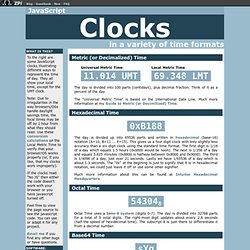
Time Zones. Time Sheet Calculator. Calculate Hours allows you to enter times worked, like: 7:45, 11, 12:10, 3, 4, 4:30 and it will add up the time worked into a meaningful hour:minute format.
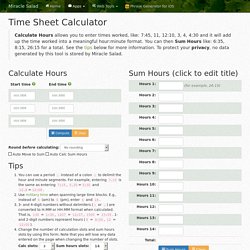
You can then Sum Hours like: 6:35, 8:15, 26:15 for a total. See the tips below for more information. You can use a period . instead of a colon : to delimit the hour and minute segments. The Tail End. Calendarpedia - Your source for calendars. How many days until ... ? Compte à rebours. Date Duration Calculator: Days Between Dates. Www.qclock.com. World Time and Converters. ChronoZoom. Time. Calendrica. Temporalité. Chronocentrism. Chronocentrism is the assumption that certain time periods (typically the present) are better, more important, or a more significant frame of reference than other time periods, either past or future.
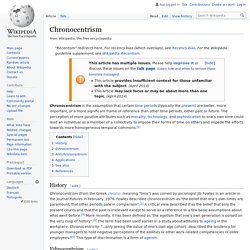
The perception of more positive attributes such as morality, technology, and sophistication to one's own time could lead an individual as a member of a collectivity to impose their forms of time on others and impede the efforts towards more homogeneous temporal commons.[1] History[edit] Chronocentrism (from the Greek chrono- meaning "time") was coined by sociologist Jib Fowles in an article in the journal Futures in February, 1974.
Ethnocentrism[edit] Chronocentrism as ethnocentrism is the perceiving and judging of a culture's historical values in terms of the standards of one's own time period. Antichronocentrism[edit] Applications[edit] See also[edit] References[edit] When time became regular and universal, it changed history. What year is it?
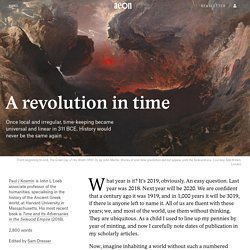
It’s 2019, obviously. An easy question. Last year was 2018. Next year will be 2020. Physics explains why time passes faster as you age. Mind time and clock time are two totally different things.
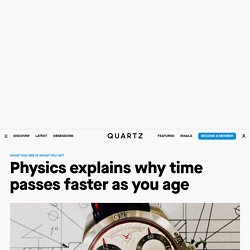
They flow at varying rates. Why Time Feels Like It’s Flying By (and How To Slow It Down) Why Each Year Seems To Disappear More Quickly Than the Last. By Anna Hunt For most people, each passing month of their lives seems to feel shorter than the previous.
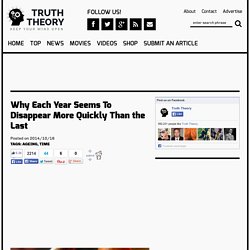
Many of us can’t believe that stores are already starting to display Christmas products, and if you’re writing a check, you might still catch yourself writing 2013 when 2014 is nearly over. Do you really need more time? The single biggest “push back” I get from people when I share about how building practices into their life can unleash new ideas and help them be more productive goes something like this: “Yeah, that’s great, but I really just don’t have the time.”

After collecting myself, I reply…Did you at any point in the last week: Watch TV? Read for pleasure? Check Facebook/Twitter? The Psychology of Time and the Paradox of How Impulsivity and Self-Control Mediate Our Capacity for Presence. “Reality is never and nowhere more accessible than in the immediate moment of one’s own life,” Kafka once told a teenage friend.
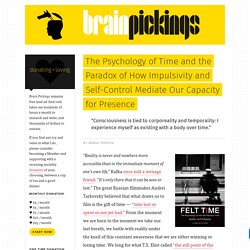
“It’s only there that it can be won or lost.” Who is the Man with the Name that Rhymes? It's been a while since another post. There are many topics that I have cached that I'd like to write on. If it weren't for the troubling aspect of so many things eating at my free time, you'd see more posts on here. I'm not sure there are many readers on here anyway, I've notice the traffic has slowed down to very little these days. Partly because Google hasn't been indexing the site correctly which I fixed not too long ago. Why Time Slows Down When We’re Afraid, Speeds Up as We Age, and Gets Warped on Vacation. By Maria Popova “Time perception matters because it is the experience of time that roots us in our mental reality.”

Given my soft spot for famous diaries, it should come as no surprise that I keep one myself. Perhaps the greatest gift of the practice has been the daily habit of reading what I had written on that day a year earlier; not only is it a remarkable tool of introspection and self-awareness, but it also illustrates that our memory “is never a precise duplicate of the original [but] a continuing act of creation” and how flawed our perception of time is — almost everything that occurred a year ago appears as having taken place either significantly further in the past (“a different lifetime,” I’d often marvel at this time-illusion) or significantly more recently (“this feels like just last month!”). How the Brain Stops Time.
One of the strangest side-effects of intense fear is time dilation, the apparent slowing-down of time. It's a common trope in movies and TV shows, like the memorable scene from The Matrix in which time slows down so dramatically that bullets fired at the hero seem to move at a walking pace. In real life, our perceptions aren't keyed up quite that dramatically, but survivors of life-and-death situations often report that things seem to take longer to happen, objects fall more slowly, and they're capable of complex thoughts in what would normally be the blink of an eye. « L'écoulement du temps est une illusion. » « Usbek & Rica explore le futur. » Ça tombe bien : voyager dans le temps, c’est possible.

La mauvaise nouvelle, par contre, c’est que l’avenir est déjà écrit. La théorie de la relativité et Einstein nous le disent depuis déjà un siècle. Ces discours pourtant, nous les entendons de loin, comme des vérités abstraites et des réflexions farfelues de scientifiques ésotériques. Le physicien Thibault Damour, professeur à l’Institut des hautes études scientifiques et membre de l’Académie des sciences, déplore que notre conscience collective n’ait jamais intégré ce que la science fondamentale du XXe siècle nous dit sur le monde. Introduction - 10,000 Year Clock. The full scale 10,000 Year Clock is now under construction. While there is no completion date scheduled, we do plan to open it to the public once it is ready. The essay below by Long Now board member Kevin Kelly discusses what we hope the Clock will be once complete. This is one of several projects by Long Now to foster long-term thinking in the context of the next 10,000 years. by Kevin Kelly There is a Clock ringing deep inside a mountain.
Proust, Rovelli e la fisica del Tempo perduto. Marcel Proust, Philip Dick, Nagarjuna: intrecci e similitudini con la concezione fisica del tempo di Carlo Rovelli. di Roberto Paura. Virginia Woolf on the Elasticity of Time. Long before psychologists had any insight into our warped perception of time — for instance, why it slows down when we’re afraid, speeds up as we age, and gets twisted when we vacation — or understood how our mental time travel made us human, another great investigator of the human psyche captured the extraordinary elasticity of time not in science but in art. In Orlando: A Biography (public library) — her subversive 1928 masterwork, regarded as “the longest and most charming love letter in literature,” which also gave us her insight into the dance of self-doubt in creative work — Virginia Woolf (January 25, 1882–March 28, 1941) writes: Time, unfortunately, though it makes animals and vegetables bloom and fade with amazing punctuality, has no such simple effect upon the mind of man.
The mind of man, moreover, works with equal strangeness upon the body of time. How Different Cultures Understand Time. The Hopi Conception of Time. The Dreamtime or The Dreaming. In 2002, Jeannie Herbert Nungarrayi, formerly a Warlpiri teacher at the Lajamanu School in the Tanami Desert of the Northern Territory, where I worked for many years first as a linguist and then as school principal, explained the central Warlpiri concept of the Jukurrpa in the following terms: To get an insight into us – [the Warlpiri people of the Tanami Desert] – it is necessary to understand something about our major religious belief, the Jukurrpa.
The Jukurrpa is an all-embracing concept that provides rules for living, a moral code, as well as rules for interacting with the natural environment. The philosophy behind it is holistic – the Jukurrpa provides for a total, integrated way of life. It is important to understand that, for Warlpiri and other Aboriginal people living in remote Aboriginal settlements, The Dreaming isn’t something that has been consigned to the past but is a lived daily reality.
THE SCENT OF TIME. Why England Was A Year Behind Belgium, Spain and Italy for 170 Years. Phantom time hypothesis. How could I have written a whole book about conspiracy theories without once encountering Heribert Illig? 7 Theories on Time That Would Make Doc Brown's Head Explode. Calendaris. CALENDAR DATABASE. (This page was constructed in the year 2000) Calendar Zone Major index to calendar sites, includes sections on celestial, cultural, religious, and today in history calendars, as well as holidays and the millennium. The American Secular Holiday Calendar. Yet Another Calendar Converter. Softare to calculate dates and times for equinoxes, solstices and cross-quarter days. The cross-quarter days occur midway between the equinoxes and solstices. For Imbolc, for example, (as observed in the northern hemisphere) is midway between the northern winter solstice and the northern spring equinox (also known as the northern vernal equinox), and Beltane is midway between this and the northern summer solstice.
Time management for artists.